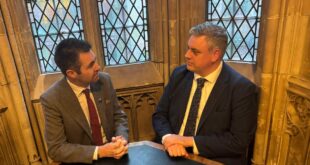Image copyright
UK Parliament
Veterans of the tumult of the 2017-19 Parliament are finding it a little hard to adjust to the relative serenity of the House of Commons elected in December.
For a start, there is a government able to get its agenda through, without having to offer side deals and compromises to one faction or another – which is why no-one expects much trouble as ministers move next week to deliver manifesto promises on extra funding for the NHS and curtailing early release of prisoners.
And the House of Lords, having attempted five amendments to the EU (Withdrawal Agreement) Bill, saw its efforts dismissed almost out of hand by the new Commons majority; how hard will they try with future legislation, I wonder?
- Countdown clock but no Big Ben in Brexit Day plan
The week will also see the elections to the chairs of Commons select committees, with nominations closing on Monday and the voting taking place on Wednesday.
Some interesting battles are shaping up, but one emerging theme is of ex-cabinet ministers seeking a new role on the committee corridor. Most spectacularly, the former foreign secretary and health secretary, Jeremy Hunt, has set his sights on the health committee, while former business secretary, Greg Clark, is pursuing the science and technology committee.
The former Welsh Secretary Stephen Crabb, is angling for the Welsh affairs committee, and, most recently, the former Northern Ireland secretary Karen Bradley has been nominated for the procedure committee. The latter is up against ‘ProcCom’ stalwart Bob Blackman – but with a majority government now in office, will the committee find it harder to push through rule changes, in any event? Or might it become the instrument for pushing back at some of the procedural innovations of Speaker Bercow, many of which were loathed by ministers?
There’s also a rare bit of open SNP dispute, with Hannah Bardell challenging Angus Brendan McNeil for the chair of the international trade committee, which could emerge as rather an important actor in the next phase of Brexit.
Here’s my rundown of the week ahead:
Monday 27 January
MPs begin their week (14:30) with Work and Pensions Questions. Watch out for auditioning from Labour contenders to chair the select committee (former treasury minister Steven Timms etc).
The main debate will be on the second reading of the NHS Funding Bill – another example of the fashion for governments to legislate to compel themselves to stick to their announced policy, which can be traced back to commitments to build new dreadnoughts – battleships – for the Royal Navy in the Edwardian era.
The bill sets in stone a multi-billion pound spending commitment to increase the budget of the NHS in England (health spending decisions are devolved to the Scottish, Welsh and Northern Ireland governments) by more than a hundred billion pounds in each of the next four financial years.
There’s also an important parliamentary nerd point: this is the first bill since the election to trigger the EVEL (English votes for English Laws) procedure, and the first major bill to engage it, so it will provide the first real test of the EVEL rules.
The new procedures will kick in the following week, when MPs will sit as a Legislative English Grand Committee, at which only MPs from English constituencies will be entitled to vote. It is followed by a report stage at which all MPs can vote.
But the SNP really object to this procedure, so expect a bit of theatre from them, in which they will argue that there are knock on effects (“Barnett consequentials” in Westminster-speak) which may prompt them to try and make amendments.
The adjournment debate, led by the SNP’s Patricia Gibson, is on the Claim of Right for Scotland – she will argue that the entire basis of the devolution settlement has been undermined by the EU Withdrawal Bill, despite the Scottish Parliament withholding its legislative consent. This is a point the SNP make at every possible opportunity.
In the Lords (14:30) peers question ministers on UK participation in the EU’s science programme, Horizon 2020, beyond the Brexit transition period, as well as the availability of children’s emergency beds in the NHS in England and support for children excluded from mainstream schools.
The main debate is on the second reading of the Air Traffic Management and Unmanned Aircraft Bill, which, following the forced closure of Gatwick airport because of a suspected drone last year, aims to tackle illegal use of unmanned aircraft.
Image copyright
Getty Images
There has been discussion of moving the House of Lords to York
This includes giving the police the ability to require a person to land an unmanned aircraft, issue fixed penalty notices for certain offences and introduce new stop and search powers where particular offences involving an unmanned aircraft have been committed.
The bill will also give the police powers to tackle the unlawful use of unmanned aircraft and grant the transport secretary powers to ensure that airports modernise their airspace, to lower CO2 emissions from aviation, and to fine airports that don’t implement changes quickly enough.
That is followed by a short debate on the current health of the reserve forces.
Tuesday 28 January
The Commons day opens (11:30) with health and social care questions.
In the absence of any urgent questions or government statements, MPs will then move on to detailed scrutiny of the Direct Payments to Farmers (Legislative Continuity) Bill, in committee of the whole House, followed by the third reading of the Bill (which will probably amount to a brief rubber-stamping).
This is a Brexit measure to replace the payments to farmers under the EU Common Agricultural Policy, to ensure that farmers can continue to receive their expected payments for the claim year 2020. The bill also includes powers for ministers to increase the total maximum amount of direct payments in 2020.
Then come two important statutory instruments (already agreed by the Lords) which are intended to implement the government’s promise to clamp down on the early release of prisoners.
At the moment prisoners serving standard determinate sentences are automatically released half-way through their sentence – including those convicted of very serious offences. These changes will mean that the most serious offenders will in future spend two-thirds of their sentence in custody.
In Westminster Hall, debates include: fire risk in flats and shared housing (09:30); the UKAEA Public Service Pension Scheme survivor’s pension (11:00); Antarctica science and diplomacy (14:30); London suburbs and local service provision (16:30) and, finally, incineration of industrial and commercial waste. Labour MP Stephen Doughty is opposed to a local incinerator being built and wants to highlight what he says is a lack of a clarity on policy on incinerators and emissions control – as well as recycling of industrial and commercial waste.
In the Lords (14:30) questions to ministers range across NHS compliance with the General Data Protection Regulation, children looked after by local authorities and those who are adopted, and increased participation of SMEs in the apprenticeship levy.
Image copyright
UK Parliament
Leader of the House Jacob Rees-Mogg is responsible for Commons business
The day’s main legislating is on the second reading of the Pension Schemes Bill – the kind of technically complex but uncontroversial legislation that governments often start in the Lords.
The bill covers what used to be called collective defined contribution schemes – a model which exists in other countries, notably the Netherlands, but will be new to the UK. The chief proponents of the scheme have been the Royal Mail and the Communications Workers Union. The government had considered legislating for a Royal Mail scheme only, but ultimately decided to bring in a general provision.
The bill also gives the pensions regulator more powers, intended to enable prevention of BHS type problems, with closer supervision and larger penalties. Finally, it provides legal underpinning for a “pensions dashboard” system. Overall the bill is uncontroversial, but there may be important technical questions, so expect probing through committee stage amendments.
Wednesday 29 January
The Commons day begins (11:30) with half an hour of international development questions, followed by what will be pretty close to half an hour of Prime Minister’s Question Time.
So far, this year’s episodes of PMQs have demonstrated Speaker Hoyle’s determination to keep the occasion to its scheduled half hour, with MPs who speechify their way through a long involved question finding themselves cut short by a brusque intervention from the chair.
That’s followed by two opposition day debates, on home affairs and homelessness.
In Westminster Hall, subjects for debate include: gypsies, travellers and the planning system (09:30); the rights of British overseas passport holders in Hong Kong (11:00); special educational needs and disability funding (14:30); compensation for bovine TB – a subject also due to be raised in the Lords – (16:00); and UK defence rotary strategy (16:30).
In the Lords (15:00), questions to ministers cover the establishment of the government’s promised Constitution, Democracy and Rights Commission. This has attracted the attention of the regiment of constitutionalists on the red benches, including, on this occasion, the former clerk of the Commons, Lord Lisvane.
Expect continued hammering away at the remit and membership of this body, especially given ministerial musings about relocating peers to York or Birmingham. There’s also a question from the former Food Standards Agency chair, Lord Krebs, on the Godfray Report, about achieving bovine tuberculosis free status for England.
Then, peers will deal with all stages of the Direct Payments to Farmers (Legislative Continuity) Bill in a single gulp. Because this is a money bill, and money matters are the preserve of the Commons, this will be a rubber-stamping exercise.
Last business is a 90-minute short debate on the steps to improve social mobility proposed in the Sutton Trust’s mobility manifesto.
Thursday 30 January
The last parliamentary day before the UK leaves the EU opens (09:30) with transport questions in the Commons, followed by the details of weekly business from Leader of the House Jacob Rees-Mogg.
With the moment of Brexit now scheduled for 23:00 on Friday, the Commons marks the occasion with a general debate on Global Britain
In Westminster Hall (13:30) the former Scottish secretary, David Mundell, opens a debate the effect of US tariffs on the Scotch whisky industry, following up on his urgent question in October. The US has already imposed tariffs on malt whiskies, in retaliation for EU duties imposed on bourbon imports. This has badly damaged sales of scotch in a crucial market, and the US is now considering additional tariffs on blended whiskies, which would do even more damage.
Mr Mundell will warn of the long term impact the tariffs will have on an industry, which has been expanding to meet US demand, and will suggest that Brexit Britain could relax the tariffs on bourbon imports as part of a new deal with America. He will also point to the impact of US trade sanctions on other Scottish products, like shortbread and cashmere.
That is followed (15:00) by a debate on flooding in South Yorkshire, led by Labour MP Stephanie Peacock
In the Lords (11:00), questions open with the former UKIP leader, Lord Pearson of Rannoch, asking about conducting an inquiry into the accuracy of the Religion of Peace website. There are questions on establishing a trauma centre in Westminster to treat casualties in the event of a terrorist attack and on celebrating Florence Nightingale’s bicentenary and the WHO Year of the Nurse and the Midwife in 2020.
The rest of the day is taken up with balloted debates. The first is from Labour’s Joan Bakewell, on recent developments in the field of gene editing and its status in scientific research around the world. The second is from the former Scottish first minister, Lord McConnell, on the role played by defence, diplomacy and development policy in building a safer, fairer and cleaner world. The one-hour mini-debate in between these is from Lord Turnberg, on the influence of Iran on stability in the Middle East.
Neither House sits on Friday 31 – and when Parliament returns on Monday, the UK will no longer be a member of the EU.
Source link


